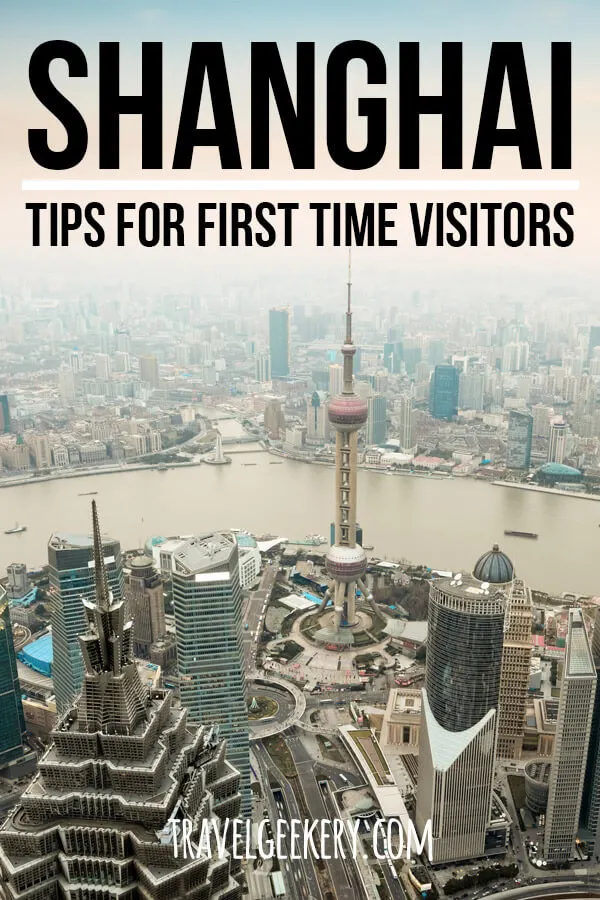Table of Contents
This post is also available in:
![]() Čeština
Čeština
Back in 2010, I lived in Shanghai for 3 months. Thanks to a recent business trip, I was able to see Shanghai anew, all fresh and shining.
As I had already spent a good amount of time in Shanghai, it all seemed pretty normal to me. But since I was visiting the city with colleagues who had never been to China before, I realized that many things in China and Shanghai are quite out of the ordinary. Which is what led me to write this post.
If you plan to visit Shanghai for the first time, I hope you’ll find it helpful!
I’ve collected some pearls of wisdom from friends who call Shanghai their home, combined those with my own observations and put together a list full of Shanghai travel tips and important things to know when visiting China for the first time.
Check out affordable flights to Shanghai with JustFly.
Visit Shanghai and see China in its most modern form
Shanghai is like no other city in China. One of the main things to know about Shanghai is that it’s the government’s showcase of how modern China can be. Some of the modern advancements came out of necessity, such as the complete abolishment of fuel-powered motorbikes.
The permit to own a fuel-powered motorbike is very expensive and at the same time there are subsidies for purchasing an electric one. The result? All scooters and motorbikes, even the most shabby-looking ones, are nowadays electric.
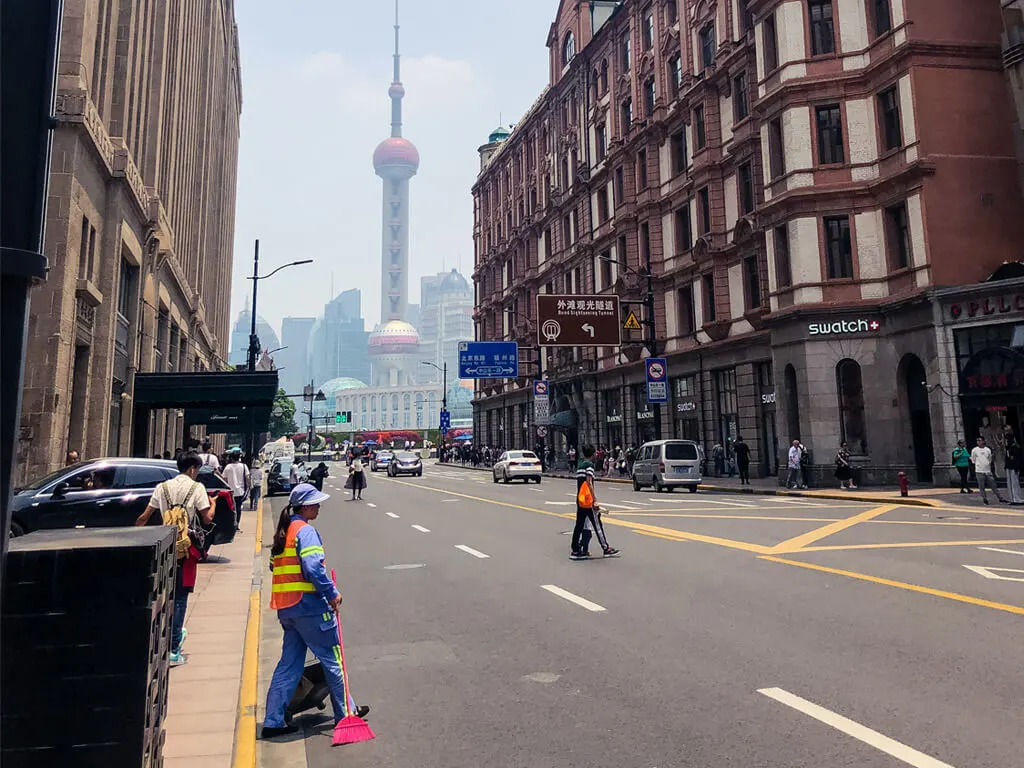
Beginning of Nanjing Road with the view of Lujiazui TV Tower
Be ready to be watched at all times
You’ll notice them almost immediately. The cameras pointed at you are everywhere. Big Brother is without a doubt watching your every move.
I found the cameras on the Nanjing Road the most fascinating, as they hang from traffic lights like ripe fruit.
Taxis are cheap
If you’re wondering how to travel in Shanghai and get around in the most convenient way, you might consider hopping into a taxi.
The taxi prices in China are regulated and haven’t moved an inch for years. That’s good news for us travellers, much less for the actual drivers.
In 2019 a 50km ride from The Bund to Hongqiao Airport cost 100 RMB. That’s $15 or €13. Just remember to get an official taxi, not just any random car off the street. Also, be ready to show your destination address in Chinese as not many drivers speak English.
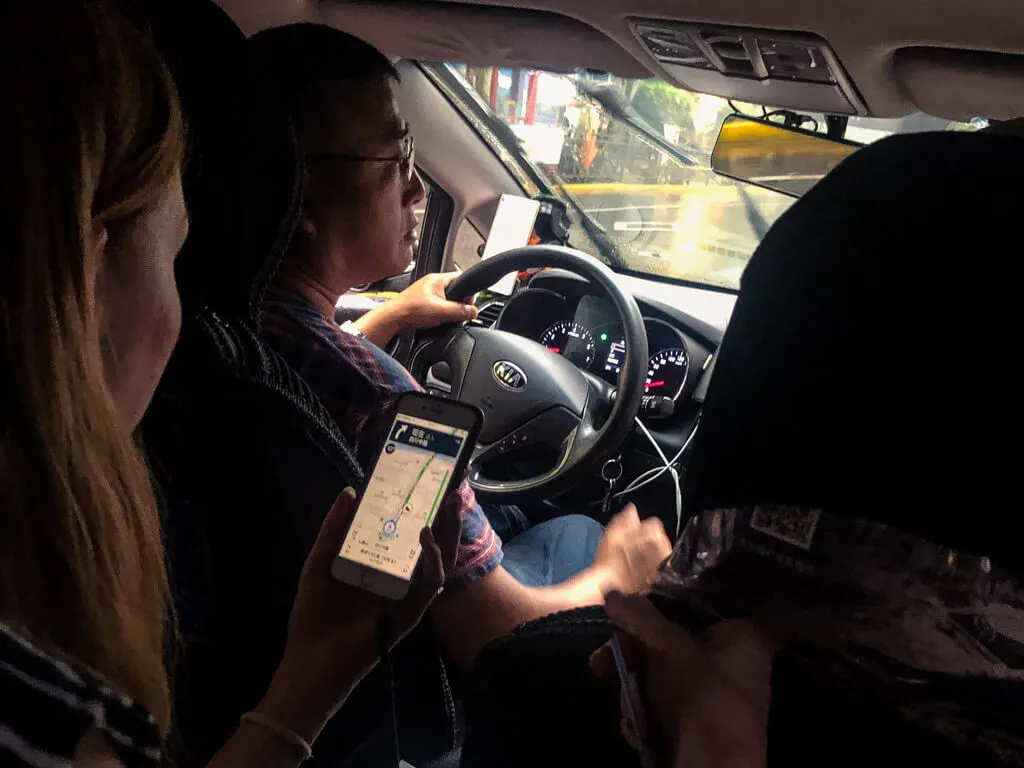
Adrenalin ride – me using a Chinese GPS app to tell our taxi driver where to go, because of his poor eyesight.
Subway network is easy and convenient
Shanghai subway is so easy to navigate with clear signs helping to direct the thousands of people that pass through every day.
Even though the subway system is convenient I’d recommend taking a taxi if you’re travelling with a heavy suitcase. It’s because when entering any metro station, larger pieces of baggage (that includes also bigger handbags) need to be taken through an X-Ray machine.
Also, if you plan to use the public transport frequently, you might want to get a chip card and put some money on it.
The subway is the best means of transport when it rains heavily, as the road traffic gets especially congested.
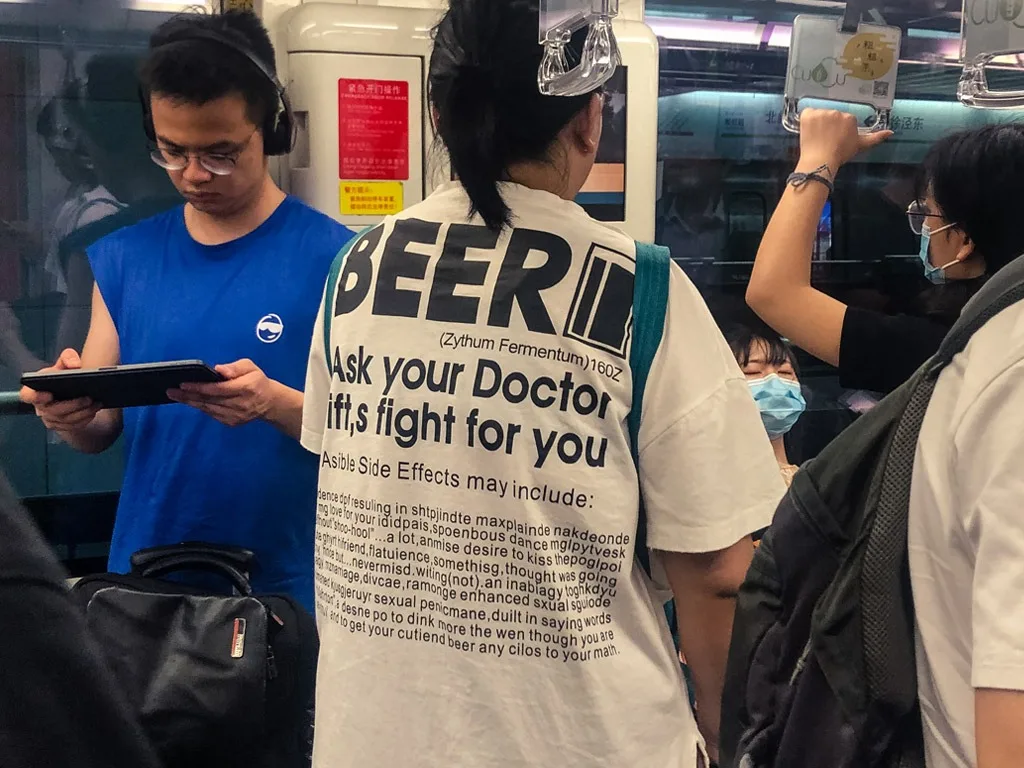
A scene from the subway. Taking it can be quite fun :)
Often the best local restaurants are hidden in malls
If you don’t happen to come across the little neighborhoods with plenty of small local restaurants, then one of my best Shanghai tips is to look for them in the malls.
The most luxurious malls often feature quality (and a bit expensive for China standards) restaurants, while the more ‘obscure’ shopping centers often provide a full on floor full of stands selling local food. Even on the busy shopping street called Nanjing Road.
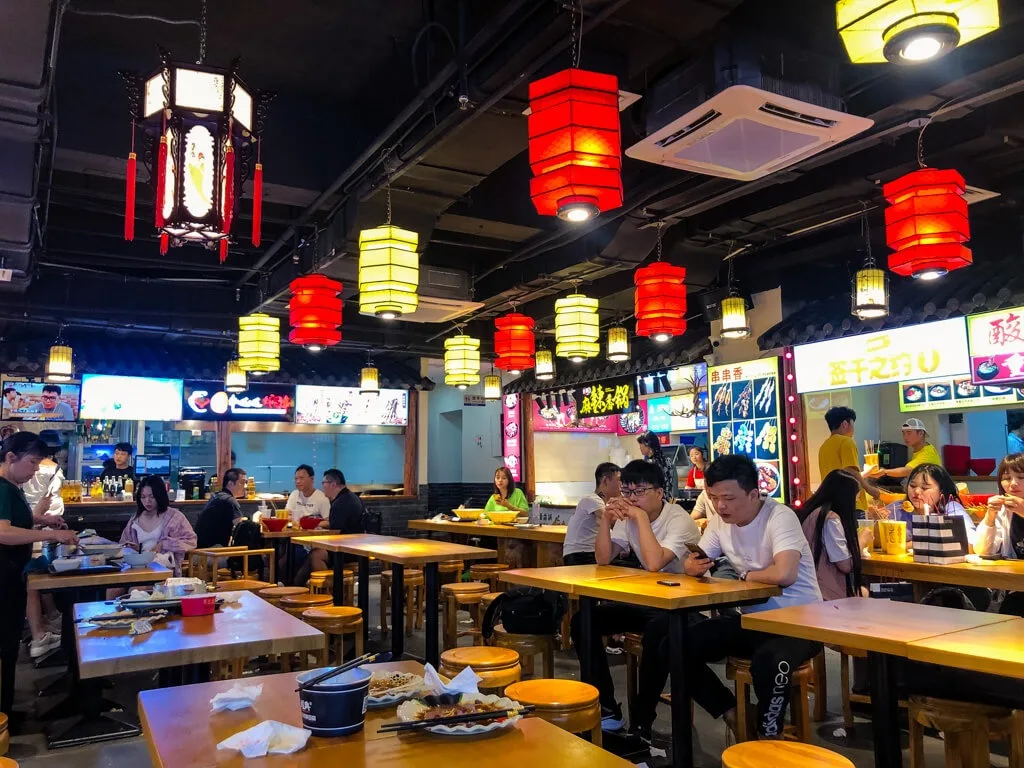
Eating in a small shopping center full of cheap and yum food stalls.
Parks on the Weekends
Your Shanghai travel should involve learning about a local culture as well. To get a glimpse of a typical weekend of a Shanghainese, venture into any park. They come alive with people dancing to the tunes of Chinese music, playing badminton, flying kites… and some older folks gamble over chess or cards.
Shanghai’s People’s Park is also special in another way. On the weekends, parents of still unwedded adults come together to exchange the details of their adult children and try to find a match. You can see elderly ladies and gentlemen sitting with a poster-like sheet full of details on how much their child earns, weighs and other important information for a successful matchmaking.
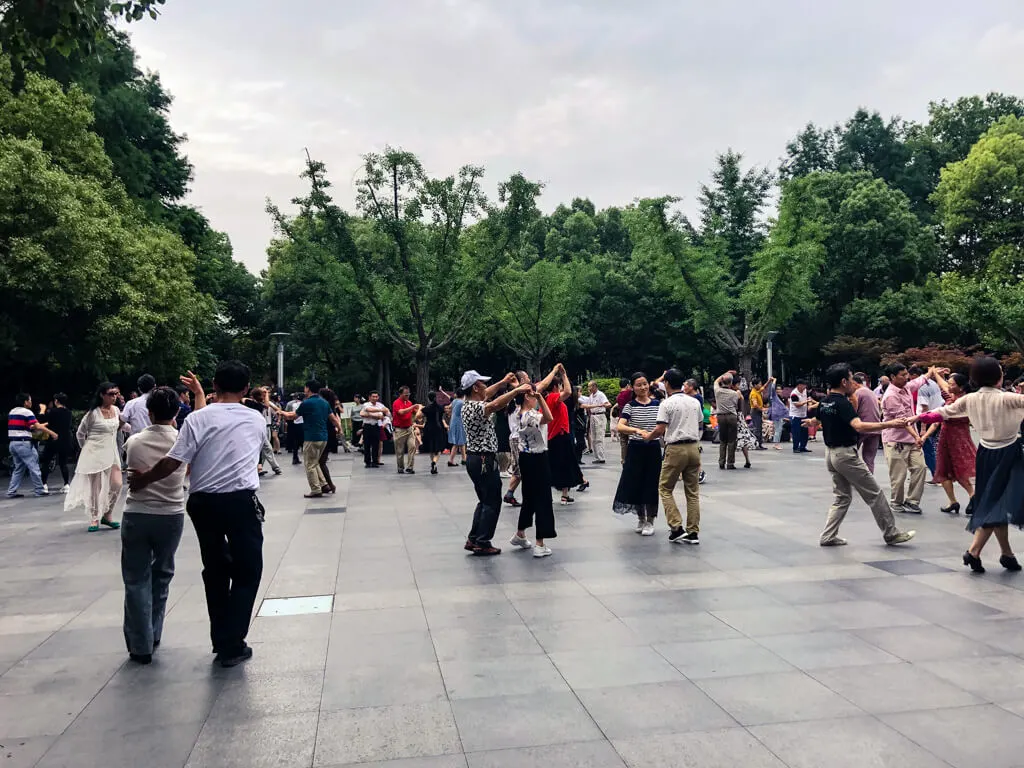
Shanghai parks beam with activity on the weekends!
No. 1 food to try: Xiaolongbao
No Shanghai trip would be complete without food.
To please your palate with the most common local delicacy, order Xiaolongbao. These are dumplings with a meat filling and soup inside. They are so yummy! Watch out though, they are served hot! Let them cool for a moment, then bite into one, suck out the soup and proceed to eat the whole thing.
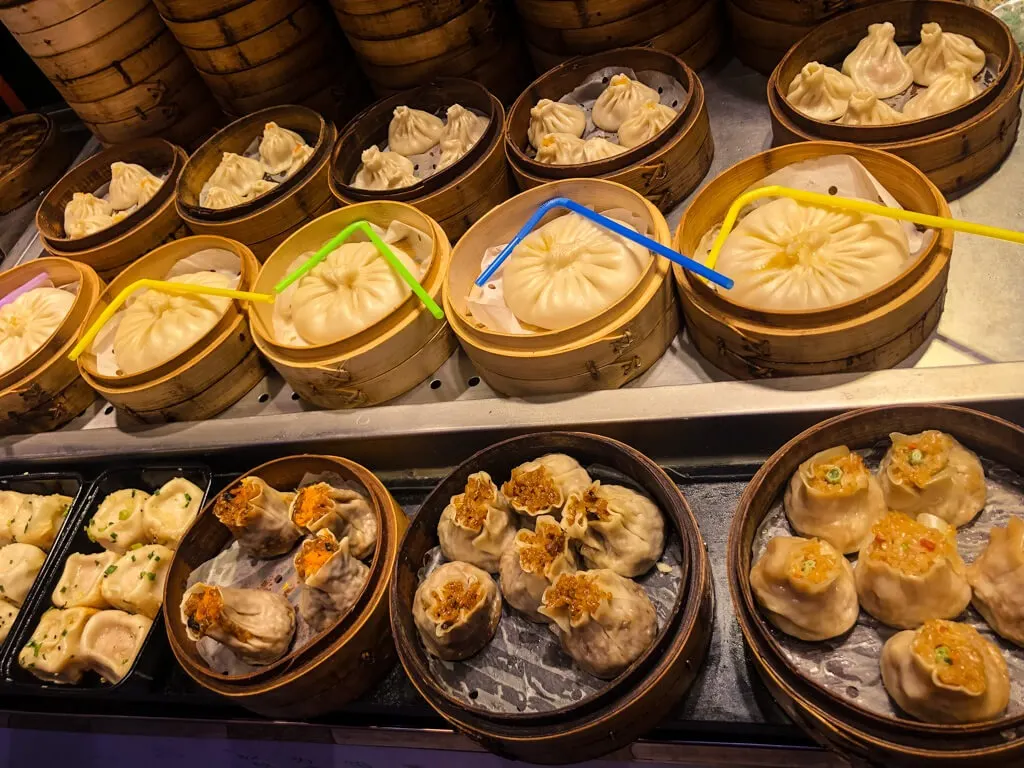
All possible versions of dumplings in Shanghai – only the top ones are Xiaolongbao, though!
Bund Sightseeing Tunnel…
… is worth it only if you have nothing else to do. Or if you have children with you. Otherwise the short ride through a dark tunnel with different illuminations is not worth travelling for, to put it mildly. :)
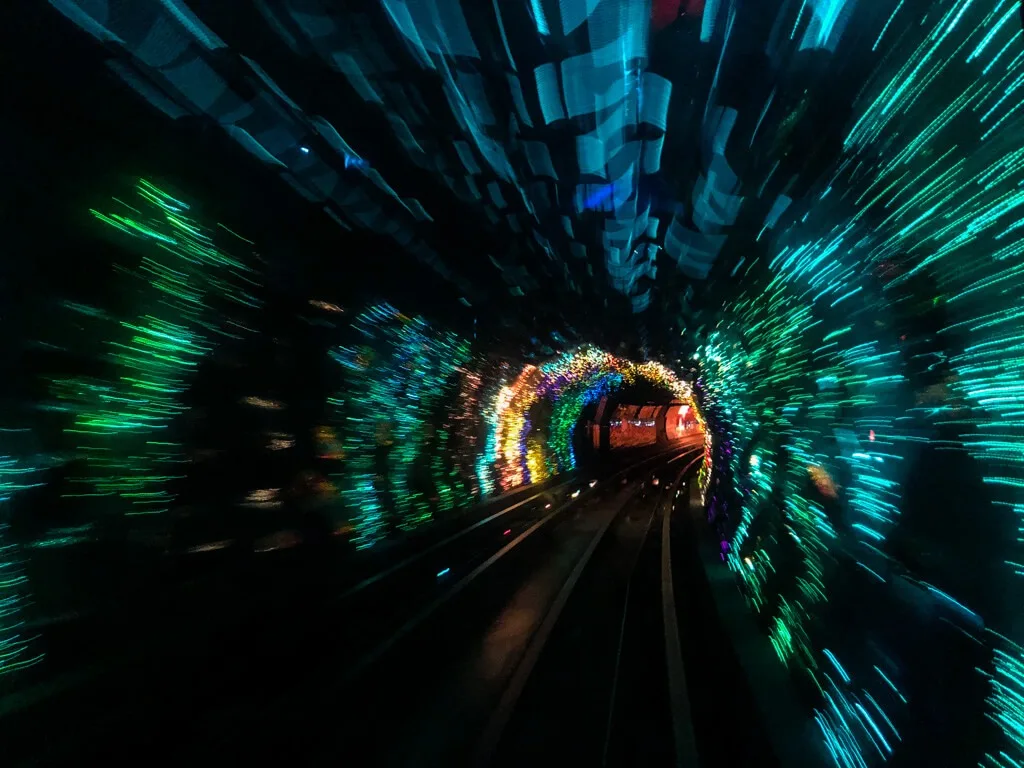
Bund Sightseeing Tunnel… looks like this. If you have chatty tourists around you, you won’t have an idea what it’s all supposed to mean.
Shanghai used to be big in jazz in the 20’s
Shanghai of the 20’s and 30’s was a melting pot of cultures with many foreign influences, which resulted in a high number of cabarets, and nightclubs, playing jazz, swing… creating an explosive mixture of a US jazz mixed with China’s folk songs.
While it’s impossible nowadays to experience that kind of vibe in Shanghai, there are still a few jazz bars worth going to. We went to the House of Blues and Jazz and loved the instrumental performance of a band consisting of Chinese artists (a saxophonist, a drummer and a piano player) with an American trumpet player and a base player whose origin remains unknown.
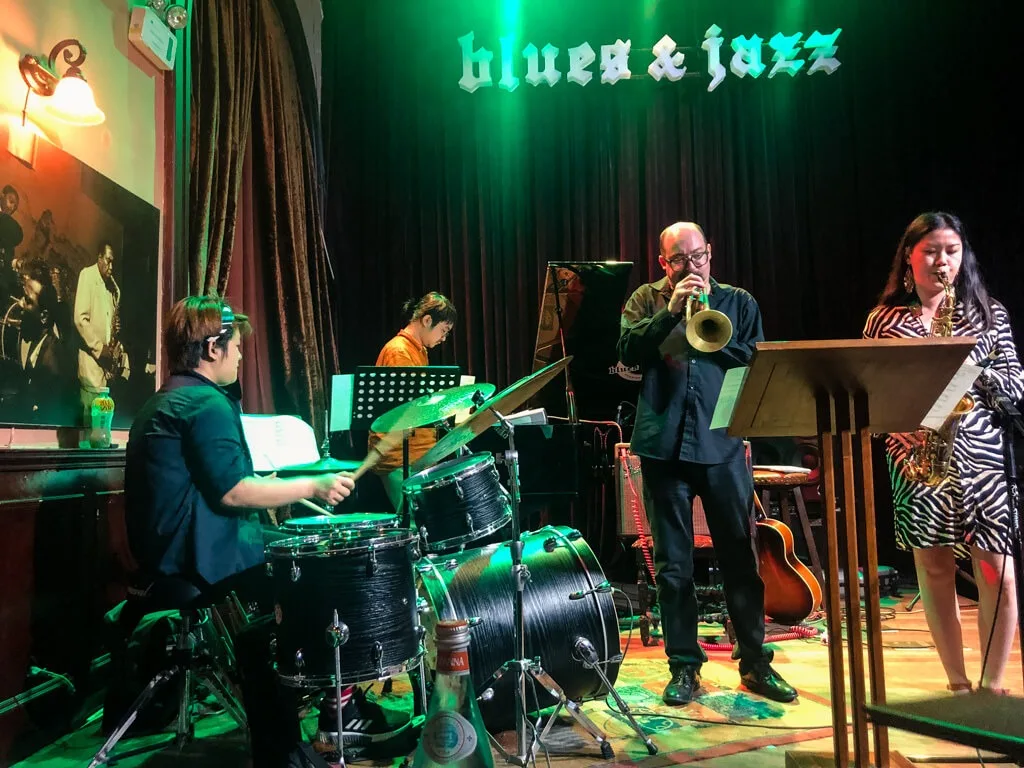
A performance in the House of Blues & Jazz
Green light doesn’t necessarily mean it’s safe to walk across a road
Always, always, look in all directions when entering a road crossing. Even though the light is as green as a grass, you can still see scooters scooping through with no care in the world. It doesn’t help that nowadays they’re all electric and totally quiet.
If there’s only one thing you can remember from this article when planning a trip to Shanghai, let it be this.
I once almost got knocked down by a scooter whose rider was turning and staring into his phone while driving quite fast.
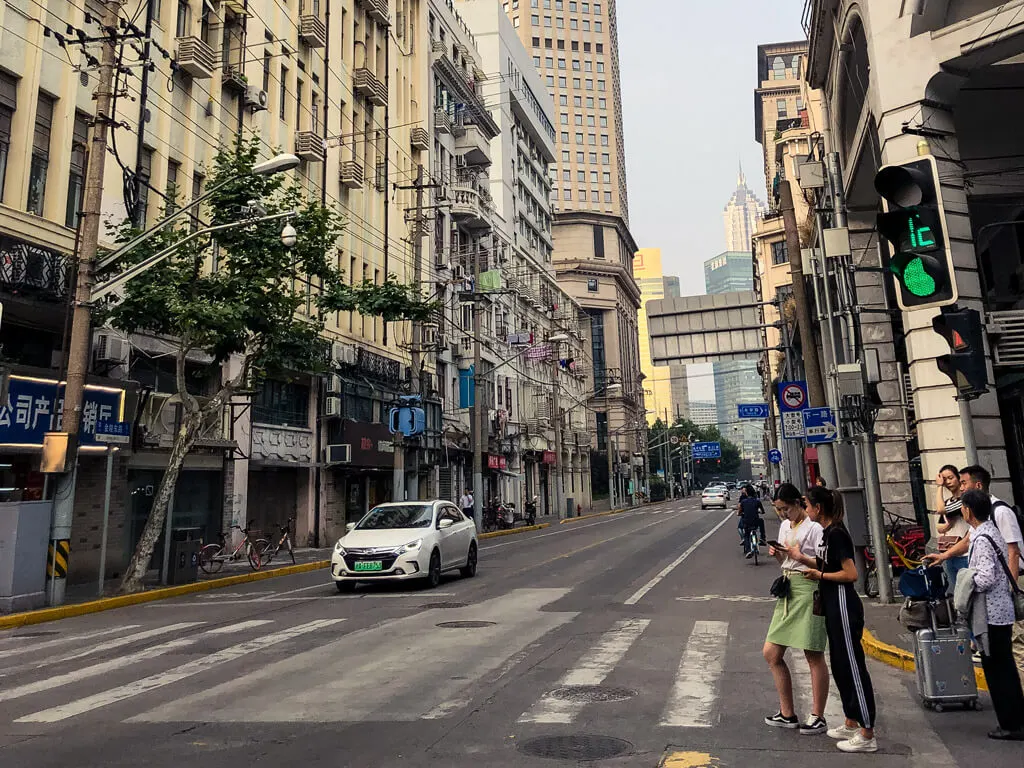
Most roads in Shanghai are not this empty :D
Carrying cash is so out
Foreigners and old people are probably the only ones who still use cash when they visit Shanghai. Otherwise it’s become a full-on cashless society here. People pay through their apps.
If you’re a tourist with no Chinese bank account, you cannot make use of the apps, even if you speak Mandarin. That means some things might stay out of reach for you, such as bike sharing or often even getting a taxi.
Say goodbye to Facebook, Twitter, Gmail, Pinterest, and Whatsapp…
Or just say hello to a (paid) VPN to keep using these sites. With social media and Google apps blocked in China, the only way to access them is through a VPN. Actually most expats use one and so do many locals, it’s a common thing.
I used Express VPN and it worked relatively well for me, especially on my phone. It was a pain to get it working on my laptop, probably because I was never on a high-speed wifi network and if it connected at all, it would disconnect every 3 minutes or so.
Also, you have to download your VPN BEFORE traveling to China. Once in China, it’s more difficult to get one.
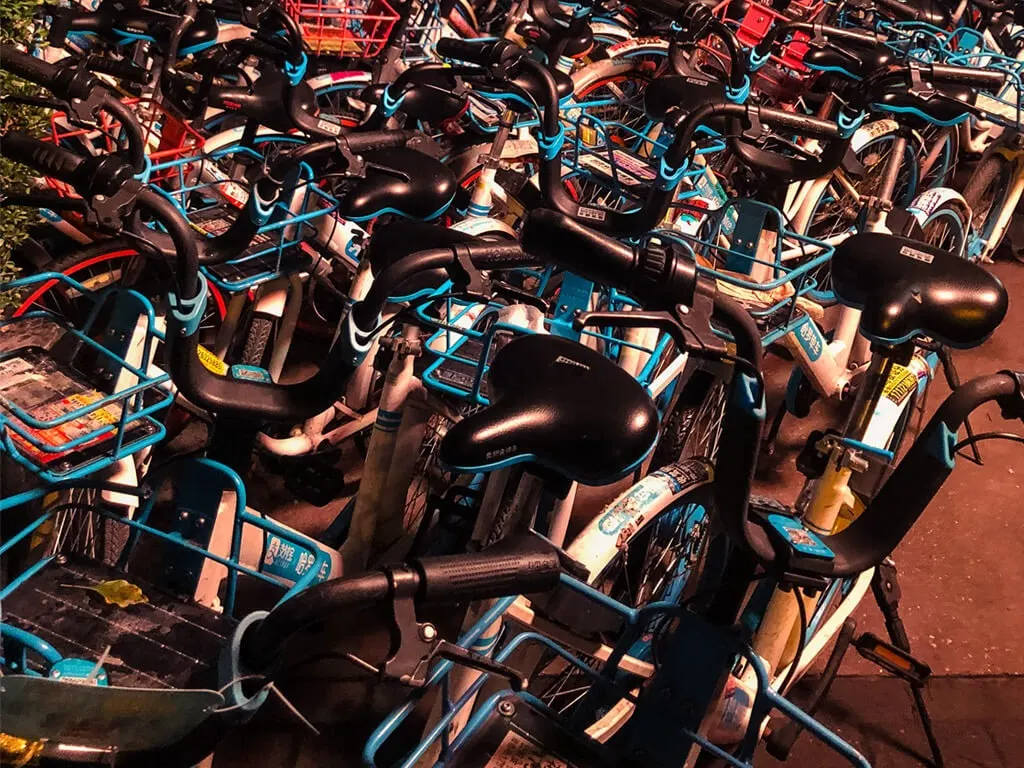
A sea of shared bikes in China – you cannot get one as a tourist without a Chinese bank account. Too bad.
You can order anything online and have it delivered anywhere
That is, if you posses a Chinese bank account or have a local friend. I experienced this first hand when my friend and I wanted a cappuccino but were running out of time due to a reservation at a special restaurant. We decided to skip going to a café altogether and instead had our cappuccinos delivered to us at the restaurant.
And if you’re now wondering – in China it’s generally ok to consume things from other places at restaurants – especially when it comes to drinks.
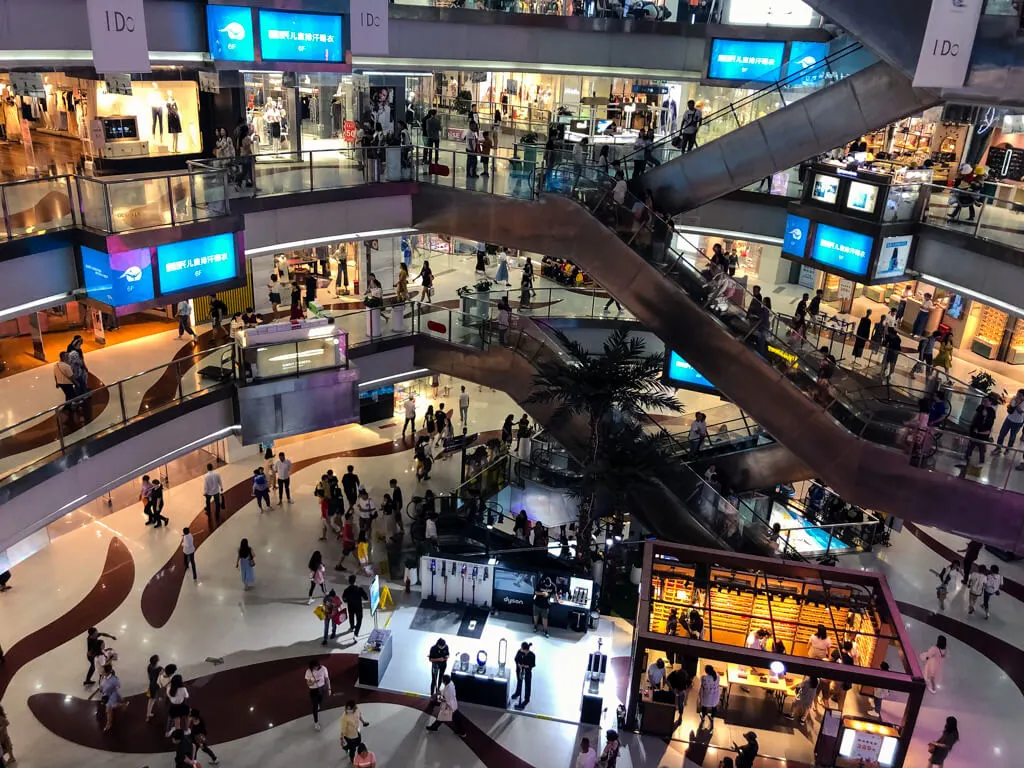
A mall in Shanghai. Full of restaurants where primary means of payment is using a QR code and a Chinese app.
Not too many people speak English
The more local you’re trying to get, the less people speak English, of course. On the street you’ll find that many of the “hole in the wall” places feature delicious street food but rarely have anyone speaking English.
In small local restaurants, you can be lucky if there’s at least some kind of an English menu with pictures.
Taxi drivers rarely speak English other than “airport” or “train station”.
Not everything that looks sweet also tastes sweet
And vice versa. Your taste buds might get a few surprises in Shanghai. When picking bread or pastry, if it’s at a small local store, watch out for any signs of it containing dried meat – it’s often sprinkled on top.
Popsicles can also have the taste of corn or peas.
Of course, if you stick to foreign grocery chains only, you’re not exposed to that. But that would mean losing out on a lot of fun!
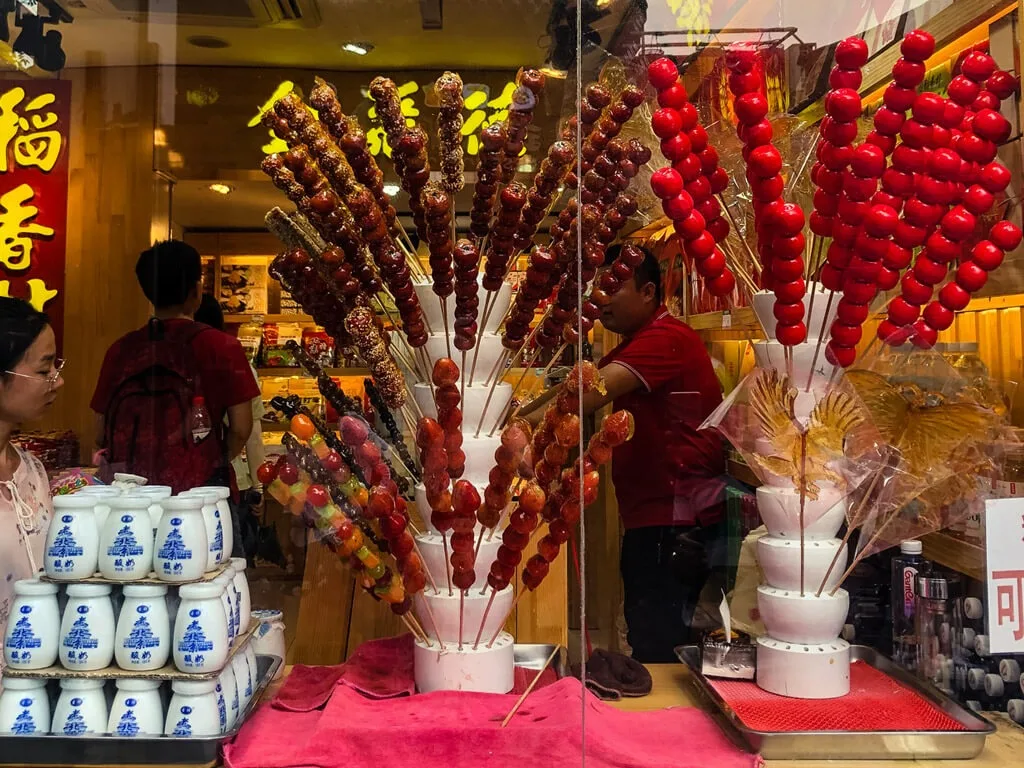
Sweets in China – yum!
Don’t drink tap water
Don’t drink the tap water in China, unless it’s been boiled. Even if you’re environmentally friendly, which is difficult to do in China. You will need to buy water in plastic bottles.
At the (Pudong) Airport there are water-refilling stations everywhere, but there aren’t many to be found elsewhere. A bottle with a water filter might be useful for China, but I haven’t tested it myself.
Let me know if you find another ingenious hack!
Shanghai tips on safety
You can see Shanghai and travel around the city in complete safety. Since everything is controlled, there’s actually no space for crime. Even pickpockets are rare. Having said that, please use common sense and don’t do any nonsensical things, like getting absolutely wasted.
At most, a taxi driver might rip you off, especially if you get one at a tourist site just off the street.
Generally speaking, China is safe for tourists.
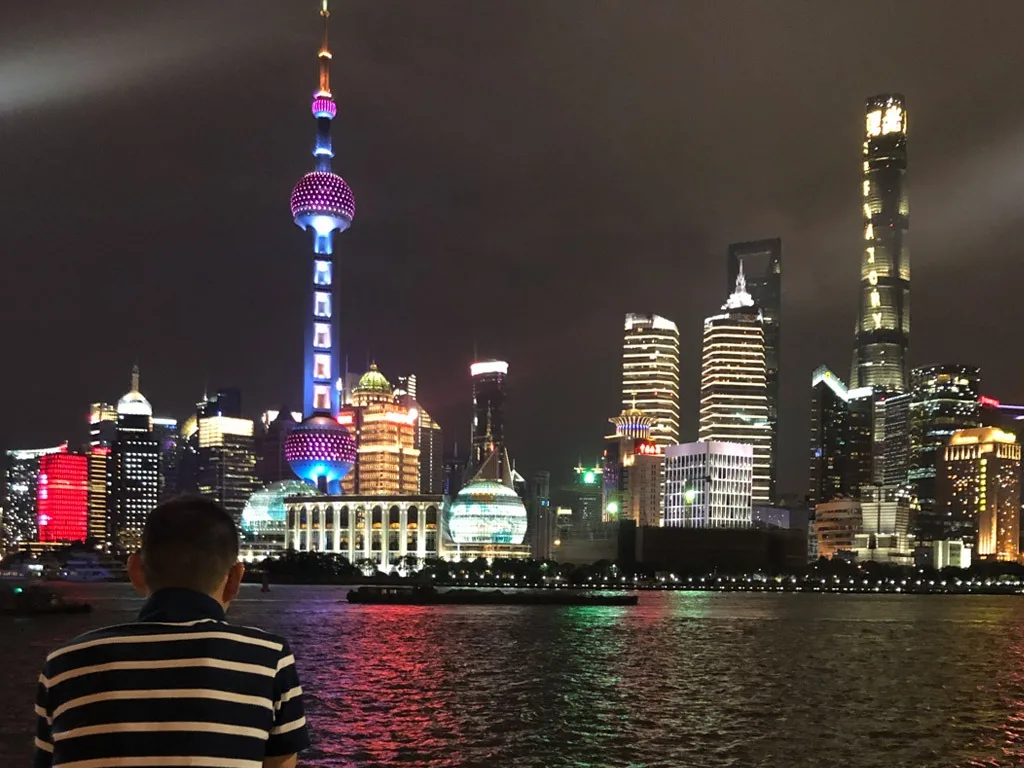
I’ve always felt safe in Shanghai
Elderly people are physically active
Elderly people in Shanghai stay very active. You might see them just walking around, stretching and clapping their hands, practicing tai chi early in the morning or dancing in the evenings.
Nearly every open area in the evening can become a venue for ladies to dance. They simply turn on music and move in the rhythm, following an instructor.
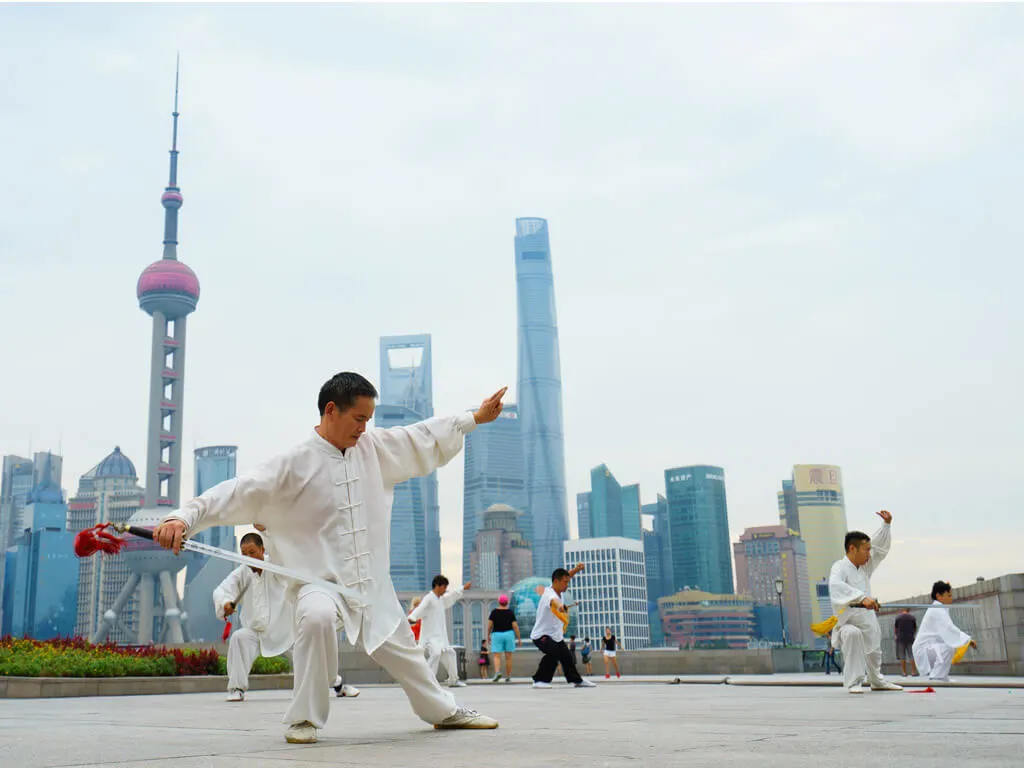
Tai chi in the morning… right on the Bund!
Ladies, embrace local toilet habits
Toilet paper is not a very common thing in public restrooms. Everyone carries tissues. I even saw a toilet paper dispensing machine, which gave out toilet paper to people who were willing to have their face read by the machine.
Also, most of the toilets are the squat down kind. If you prefer the western style of toilet, look closely at the door signs, sometimes there are a few of the western ones. If not, you gotta squat…
You should be aware that you’re supposed to throw the used toilet paper / tissue in the provided bin, not flush it down the toilet.
The good news is that there’s no lack of public toilets in Shanghai – e.g. every metro stop has at least one!
Check the air quality
Shanghai air quality is not the most wonderful in the world, but it rarely reaches dangerous levels. You can download an app called AirVisual, which will help you determine if you need to use a filter for breathing.
I never needed a filter because at the time of my Shanghai visit the air quality levels were in the 101-150 range of pollutant particles, and supposedly that’s only unhealthy for sensitive groups.
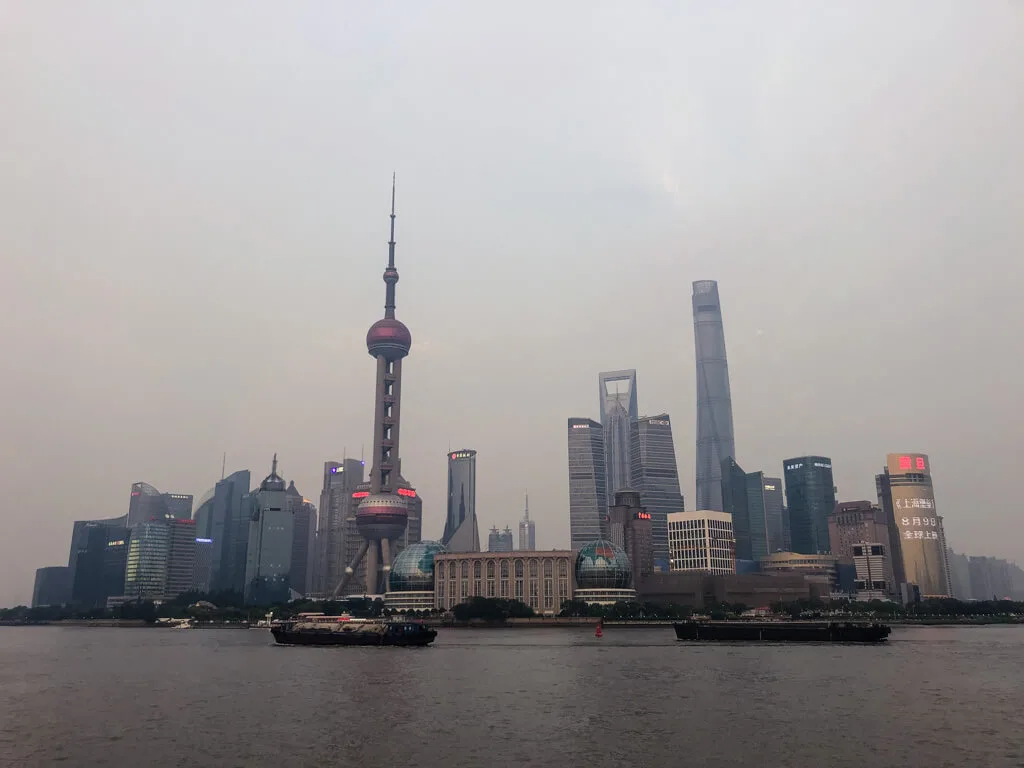
Hazy Shanghai = not the best day pollution-wise
The more local a market is, the more bargaining that needs to be done
You’d be silly to buy things for the first price offered. That mostly applies to small markets where price is often not even listed and you have to ask.
You can still do some haggling even if you don’t speak Chinese though. Walking away is the ultimate method if the seller is not accepting your reasonable price. Try it and treat it like a game.
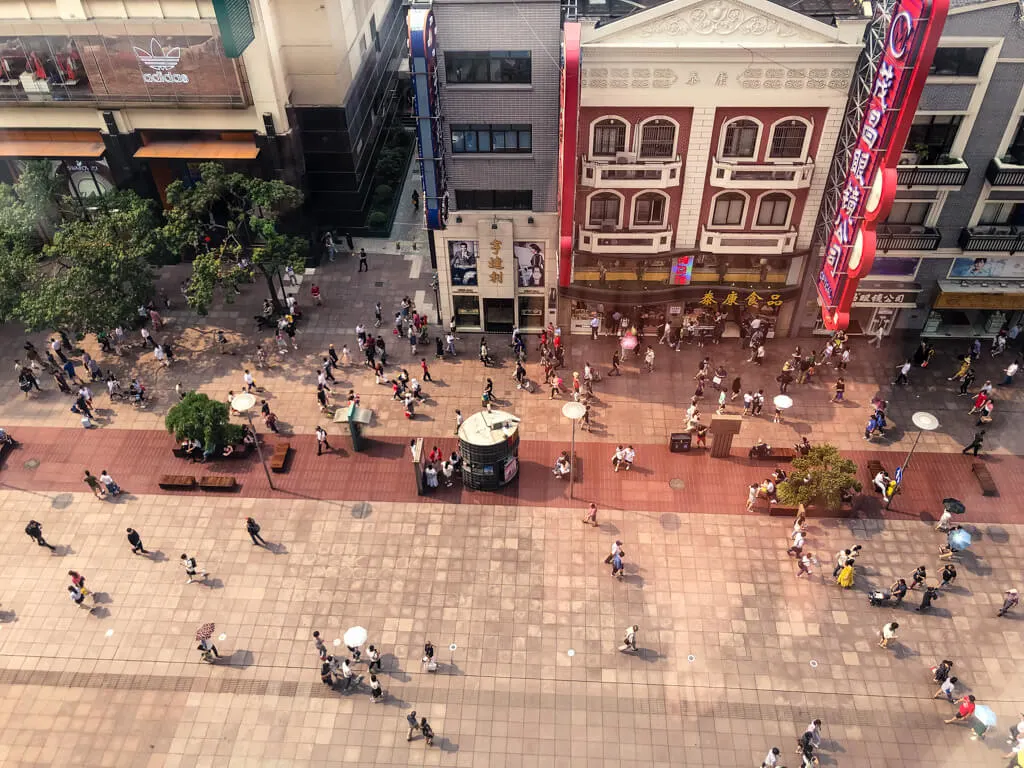
People on Shanghai’s Nanjing Street Pedestrian Zone
Download useful apps
Apart from AirVisual, I strongly suggest that you also download SH Metro for a good overview of the Shanghai subway network.
Google maps don’t work in China, but I was able to use Apple maps successfully and its public transport planning feature seemed to work quite well.
For online communication with people you travel with or e.g. locals, download WeChat. It’s China’s version of Whatsapp. It works well and is available in English.
See a great overview of apps useful for China.
Get a local sim card
For mobile data without paying horrendous roaming fees, you have no chance other than getting a local sim card.
It’s easy, just know that you’ll need to let the provider make a copy of your passport along with taking a photo of you holding your passport.
If you get the sim card at Pudong Airport, like I did last time, you might feel overwhelmed by all the offers.
When I was there I found three local companies, sharing the same long counter, selling their own sim cards with the employees of each company shouting at me in unison. Still, it was an easy choice as all the offers were the same.
If you’re vegan, raw, gluten-free… you might have a tough time
It’s still quite easy with vegetarian options when you visit China, but more restrictive diets become difficult.
I had a colleague who couldn’t eat most things due to allergies and going to local restaurants meant she had to resort to rice and a very diligently selected meal, usually just plain meat or potato strips. I can speak some Chinese and know some of the meals well, so we could always find something for her, but it was a challenge.
It becomes a lot easier just eating at Western restaurants or e.g. at Japanese ones.
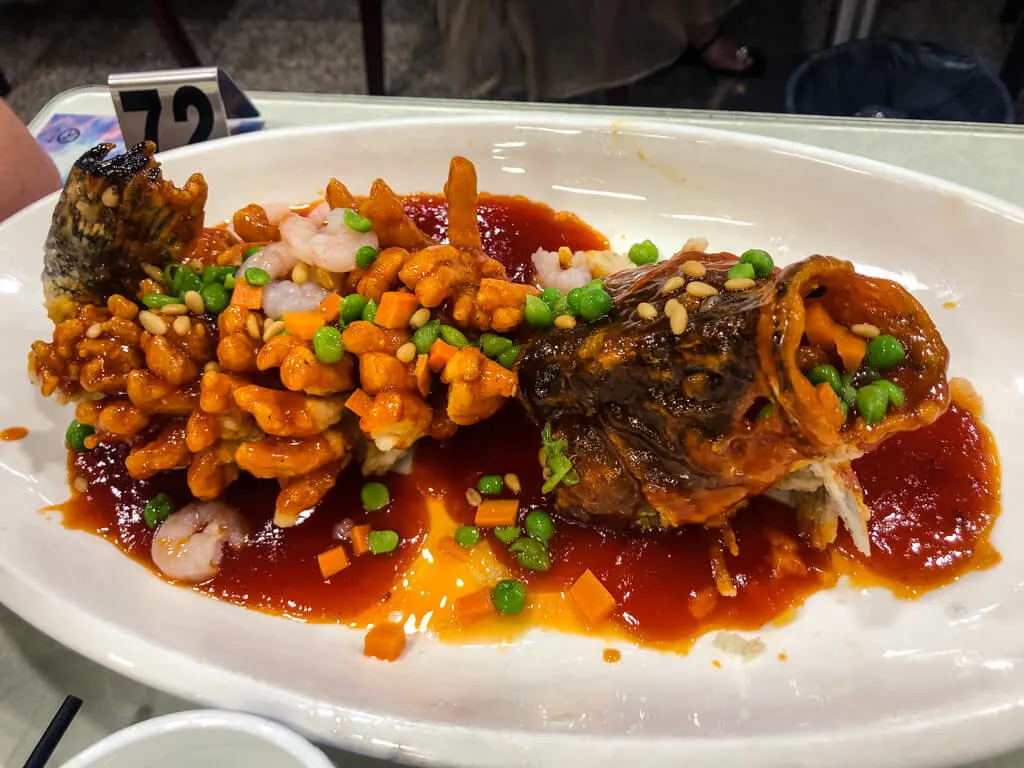
The waitress claimed there was no egg, milk or gluten used in making of this pricy fish… but we were not so sure (the spikes on the back were deep fried in a dough)
Shanghai’s layout and the different neighborhoods
If you want to have it easier with Shanghai’s layout and general geographic denominations, learn these words:
North – Bei 北
South – Nan 南
West – Dong 东
East – Xi 西
Then you’ll know that e.g. Pudong refers to the West of the River HuangPu or that Nanjing is in the North from Jing’an district (and temple).
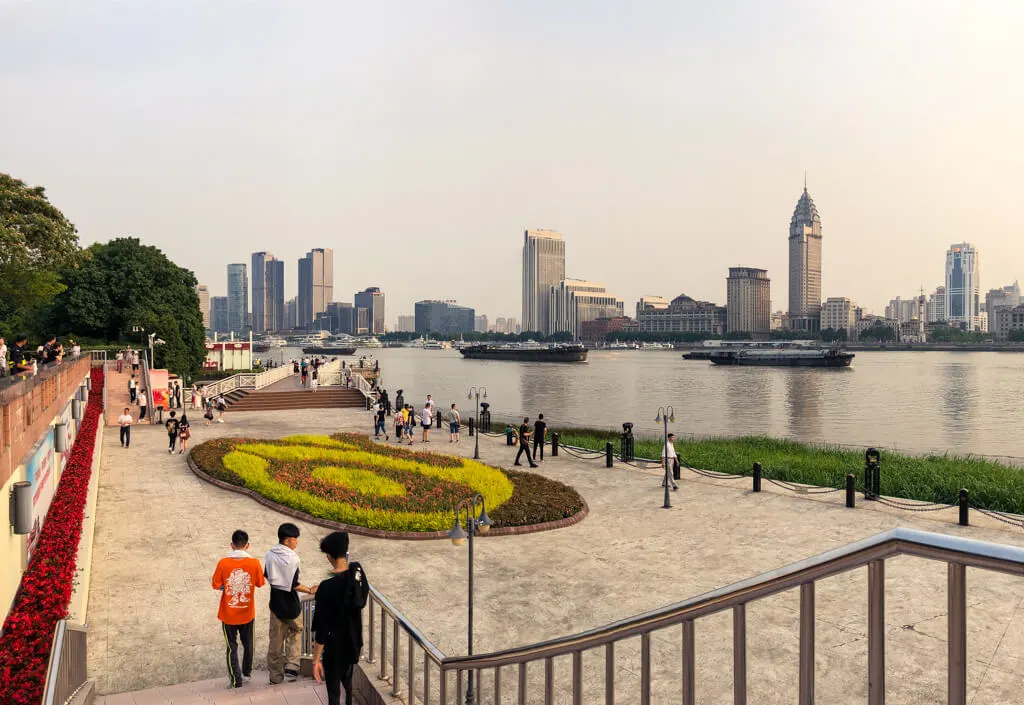
Huangpu River waterfront. Beautiful!
Only going to Shanghai is not enough to get a picture of what China’s like because it’s so unique and different. If you’re curious to know more about China, you can read a few more of my posts here.
I hope you’re excited about your upcoming trip to Shanghai and that some of my tips for visiting Shanghai and random observations will serve you well. Let me know!
